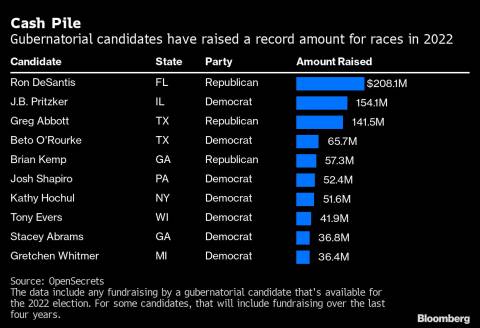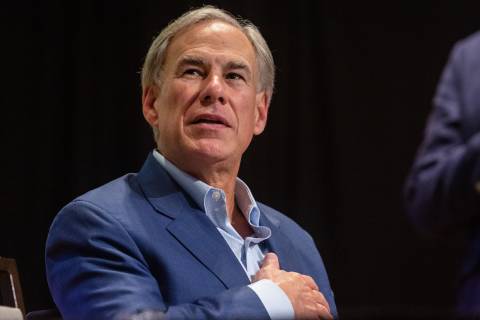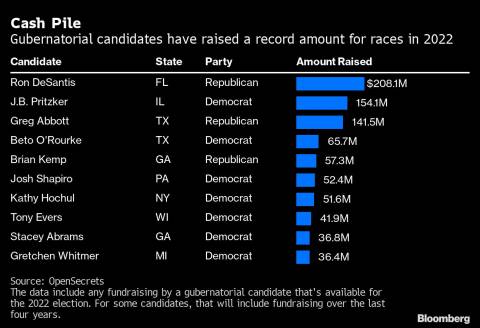(Bloomberg) -- Ron DeSantis won a second term as Florida governor, a victory that could bolster a potential challenge of former President Donald Trump for a White House run in 2024.

The Republican governor beat Democratic challenger Charlie Crist by a tally of 59% to 40% in the third most populous state in the US, according to Associated Press, with an estimated 88% of votes counted.

DeSantis, 44, hasn’t said he plans to run in 2024 and squarely avoided questions about the presidential race during his debate with Crist. Still, he has constantly popped up in polls as GOP voters’ preferred standard-bearer should Trump decide against making a third presidential bid. DeSantis has also secured the support of big-ticket donors, including billionaire Citadel founder Ken Griffin.

DeSantis won one of the 36 gubernatorial races taking place across the US Tuesday. They’re taking on added significance this year after the US Supreme Court put the polarizing issue of abortion in the hands of state governments and limited what they can do to regulate guns. Those issues were front and center in Texas where Republican Governor Greg Abbott won, according to NBC and Fox.

DeSantis thanked voters for what he called a “historic, landslide victory” in a speech in Tampa, Florida. He didn’t mention Trump or speculation that he will run for president, but he did say “I have only begun to fight.”

Trump escalated his rivalry with DeSantis, warning that he would expose damaging information if the Florida governor were to challenge him for the Republican presidential nomination.
“If he runs, he could hurt himself very badly,” Trump said in an interview with Fox News and other outlets. “I would tell you things about him that won’t be very flattering -- I know more about him than anybody, other than, perhaps, his wife.”
DeSantis’s victory is also a win for the conservative, headline-grabbing brand of politics he carried out during his first term. The Republican incumbent won the important Latino vote in Florida, according to exit polls conducted by CBS News: 56% of Latinos voted for DeSantis. The number represents a big swing in Hispanic support toward Florida Republicans over the last four to six years. DeSantis lost the Latino vote in his previous election.
He clashed with President Joe Biden over vaccine and mask mandates, blasting him for establishing a “biomedical security state.” He then shifted his focus to culture-war issues, especially a law limiting school instruction about gender identity. A couple of months ago, he used taxpayers’ dollars to fly dozens of Venezuelan migrants from Texas to Martha’s Vineyard, Massachusetts.
The strategy was key in raising DeSantis’s profile as a potential Republican presidential candidate. Trump has teased for months that he plans to run again in 2024, and while he’s still the favored pick among GOP voters, his political baggage and legal troubles could prove an obstacle for another run.
Abbott Wins
Abbott beat Democratic candidate Beto O’Rourke to win re-election for a third term as governor of Texas, signaling voters approved of his hardline conservative views.
Abbott was favored to win, with polls showing the incumbent having anywhere from a five to 11 percentage points lead. The results suggest Texans still trust Abbott to lead the state on issues like immigration and the economy -- the top concerns among voters. Abbott’s stances favoring a ban on abortions with very few exceptions and loose gun policies were popular with his base.
The safe margin by which Abbott won the races may empower the legislature to take a more rightward slant in its policy proposals. Analysts say the greater the Republican margin, the more bandwidth elected officials have to champion ultra-conservative stances on issues like abortion and immigration.
During his campaign, Abbott spoke frequently about strengthening border security and providing property tax relief, which are two areas likely to be a focal point in next year’s session.
Pritzker, Healey Win
In Illinois, Democratic billionaire J.B. Pritzker won his re-election as expected, beating Trump-backed Republican opponent Darren Bailey, according to projections by AP.
Pritzker, 57, campaigned on his support for abortion rights and improvements in state finances and had led in the polls in a state largely controlled by Democrats.
Heir to the Hyatt hotel fortune, Pritzker contributed more than $100 million of his own money to campaign against Bailey, a state senator and anti-abortion downstate farmer who ran on concerns about rising crime, property taxes and the economy.
In Massachusetts, Attorney General Maura Healey sailed easily to victory, defeating Republican rival Geoffrey Diehl, who was backed by Trump. The 51-year-old Democrat vowed to become the nation’s most aggressive governor on climate change, and to help the state develop a “climate corridor” for innovative green technology. Her plans include appointing a cabinet-level climate czar and spurring the installation of 1 million heat pumps statewide by 2030.
She’s also making history as the state’s first woman to be elected governor.
In Maryland, Democratic nominee Wes Moore defeated Republican and election denier Dan Cox, making him the first Black governor of the state. Moore, a Rhodes Scholar who served in combat in Afghanistan, is the former chief executive officer of the Robin Hood Foundation, an organization that fights poverty in New York City and is backed by many on Wall Street.
Sarah Huckabee Sanders, the former White House press secretary during the Trump presidency, won the governorship in Arkansas. Republican Governor Kevin Stitt won re-election in Oklahoma, defeating Democrat Joy Hofmeister, a former Republican and the state’s superintendent of public instruction.
Other Races
With divisions between Democrats and Republicans deepening, the fight for the top office in Georgia has become one of the most closely watched races. New York’s first female governor is battling to stay in power after her double-digit lead against Republican opponent Lee Zeldin dramatically narrowed. Florida and California could provide insights into the 2024 presidential election.
Recent decisions by the high court have given states the power to rule on abortion rights, while taking away their ability to have strict rules about who is allowed to carry a gun in public. The conservative court has even gone as far as limiting federal power to pass regulations to curb emissions.
“There is so much at stake in this election,” Vice President Kamala Harris said at a Democratic rally with Illinois Governor Pritzker in Chicago on Sunday. “What is happening here not only has a direct impact on the people of our nation, it very well will have a direct impact on people around the world.”
The expansion of state power is sharpening the differences between red and blue states, with the former becoming more conservative and the latter more more liberal. And businesses are getting involved like never before. Gubernatorial candidates up for election in 2022 have raised a record $1.5 billion, according to data from OpenSecrets, a nonprofit that tracks campaign donations.
Nowhere is that deep divide more clear than in Georgia, where Trump-backed Republican Governor Brian Kemp is seeking re-election, facing Democratic opponent Stacey Abrams for a second time. She trailed Kemp in poll after poll, but if elected, would be the first Black female governor in the US and Georgia’s first Democratic leader in 20 years.
The rematch is being closely followed due to Abrams’s national stature as a voting activist and her role in delivering Georgia to Democrats in 2020 and 2021.
Tensions are also running high in Arizona, where Republican Kari Lake, a former television news anchor, is neck-and-neck in the polls with Democratic nominee Katie Hobbs. Lake, who is running for the first time, embraced Trump’s baseless claims of widespread fraud in 2020, and created a stir by refusing to say whether she would accept the election results.
Balance of Power
In Oregon, the balance of power could flip to the Republicans for the first time in 36 years. Christine Drazan has criticized Democratic opponent Tina Kotek, the former Oregon Speaker of the House, for homelessness in Portland, drug decriminalization and violent protests in the wake of George Floyd’s death. Kotek has made abortion rights central to her campaign. And there’s also Betsy Johnson, who is running as an independent.
The race has become polemic even in deep-blue New York, where Kathy Hochul is facing a dramatic test of her 14-month tenure in power. The Democratic candidate’s once double-digit lead against Zeldin has narrowed dramatically in recent weeks. His campaign has gotten an assist from Ronald Lauder, a member of the $32.7 billion family behind cosmetics powerhouse Estée Lauder Cos.
California Governor Gavin Newsom has such a big lead that he’s largely ignored Republican challenger Brian Dahle, appearing in only one debate that took place on a Sunday afternoon during a San Francisco 49ers football game. Newsom has emerged as one of the Democrats’ most cited culture warriors, signaling his interest in a role that goes beyond California, though he has repeatedly denied interest.
--With assistance from Christian Hall, Margaret Newkirk, Airielle Lowe, Zach C. Cohen, Gregory Korte, Shruti Date Singh, Tarso Veloso, Alyce Andres, Keshia Clukey, Emma Court, Amanda Albright, Karen Breslau, Tiffany Stecker, Ryan Teague Beckwith, Jack Gillum and Felipe Marques.
More stories like this are available on bloomberg.com
©2022 Bloomberg L.P.
Author: Bloomberg News
